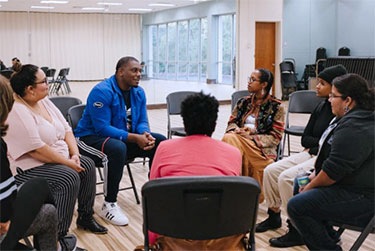More than a dozen local organizations across the U.S. are working to address racism through narrative change. One of those is Dallas Truth, Racial Healing and Transformation, a community-driven program that provides training, builds leadership and hosts public events that explore the impact of racism. In November, the program released a report that highlights the legacy of racism in Dallas and charts a new course for healing in the community.
In conjunction with the 2022 National Day of Racial Healing, Jerry Hawkins, MA, executive director of the Dallas program, shares tips for other equity advocates.
Why is racial healing an important component to addressing racial and health equity?
Racism affects all of us where we live, learn, work and play. Racism can affect us both as individuals and within our systems and institutions. It affects our ability to know, relate to and value one another, as well as our physical, emotional and mental health. Communities need tools to help heal from the damaging effects of racism.
Racial healing recognizes the need to acknowledge and tell the truth about past wrongs created by individual and systemic racism and address the present consequences. Tools like racial healing circles are experiences that engage the heart, require the heart to be open and expansive, reaffirm the humanity in all of us and acknowledge that unconscious bias lives in all of us. (They) are the spiritual work of affirming and loving ourselves and acknowledge, by listening, the harms of the past through people’s stories.
How does Dallas TRTH fit into this work?
The program’s mission is to create a radically inclusive city by addressing race and racism through narrative change, relationship building and equitable policies and practices.
Dallas TRHT envisions a city and county where no north and south divisions exist in terms of race, wealth, arts, culture, health, safety, education and opportunity, and where communities actively, honestly and openly acknowledge, repair and heal from past and present racial inequities.
Tell us about Racial Equity Now, your community training program.
The Racial Equity Now cohort, now in its third year, is designed to provide organizations and their leadership with training (and) information sharing, case study presentations, policy review and development, program development, and coaching focused on racial equity.
The Racial Equity Now cohort members participate in a 10-month series of workshops, as well as two additional months of one-on-one racial equity coaching on developing and implementing racial equity policy and equitable practices.
Dallas TRHT received an overwhelming response from the community for the initial program offering in 2019. After a rigorous selection process, 16 organizations were picked for the cohort. To date, Dallas TRHT has supported 30 Dallas-Fort Worth nonprofit organizations and has granted more than $300,000 to their racial equity endeavors.
How is your organization acknowledging the National Day of Racial Healing?
Our plans include a keynote and conversation with New York Times bestselling author, grassroots organizer and educator Mariame Kaba, and the launch of “The Mahogany Seat: Our Stories, Our Healing, Our Seat,” an experiential podcast. ( It focuses on healing racial trauma in the workplace, centering on Black women.
What advice would you give to other local organizers wanting to do this work but not sure how to start?
Read and follow recommendations in the W.K. Kellogg Foundation’s TRHT guidebook, especially the guiding principles. Find ways to reinforce and honor our common humanity and create space to celebrate the distinct differences that make our communities vibrant. Acknowledge that there are still deep racial divisions in America that must be overcome and healed.
And commit to engaging people from all racial, ethnic, religious and identity groups in genuine efforts to increase understanding, communication, caring and respect for one another.
Racism is a public health crisis. Check out APHA’s resources on racism and learn about Healing through Policy: Creating Pathways to Racial Justice, an initiative from APHA, the de Beaumont Foundation and the National Collaborative for Health Equity that promotes racial healing to address social inequities.
Photo: In October 2019, Jerry Hawkins of Dallas TRHT and Eva Arreguin of De Colores Collective lead a community healing space at the Dallas Park South YMCA. Photo courtesy Dallas TRHT.